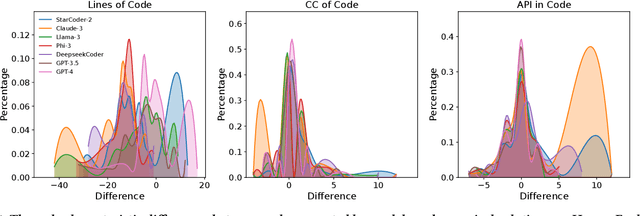Haoxiang Jia
Multi-Programming Language Sandbox for LLMs
Oct 30, 2024



Abstract:We introduce MPLSandbox, an out-of-the-box multi-programming language sandbox designed to provide unified and comprehensive feedback from compiler and analysis tools for Large Language Models (LLMs). It can automatically identify the programming language of the code, compiling and executing it within an isolated sub-sandbox to ensure safety and stability. In addition, MPLSandbox also integrates both traditional and LLM-based code analysis tools, providing a comprehensive analysis of generated code. MPLSandbox can be effortlessly integrated into the training and deployment of LLMs to improve the quality and correctness of their generated code. It also helps researchers streamline their workflows for various LLM-based code-related tasks, reducing the development cost. To validate the effectiveness of MPLSandbox, we integrate it into training and deployment approaches, and also employ it to optimize workflows for a wide range of real-world code-related tasks. Our goal is to enhance researcher productivity on LLM-based code-related tasks by simplifying and automating workflows through delegation to MPLSandbox.
What's Wrong with Your Code Generated by Large Language Models? An Extensive Study
Jul 08, 2024



Abstract:The increasing development of large language models (LLMs) in code generation has drawn significant attention among researchers. To enhance LLM-based code generation ability, current efforts are predominantly directed towards collecting high-quality datasets and leveraging diverse training technologies. However, there is a notable lack of comprehensive studies examining the limitations and boundaries of these existing methods. To bridge this gap, we conducted an extensive empirical study evaluating the performance of three leading closed-source LLMs and four popular open-source LLMs on three commonly used benchmarks. Our investigation, which evaluated the length, cyclomatic complexity and API number of the generated code, revealed that these LLMs face challenges in generating successful code for more complex problems, and tend to produce code that is shorter yet more complicated as compared to canonical solutions. Additionally, we developed a taxonomy of bugs for incorrect codes that includes three categories and 12 sub-categories, and analyze the root cause for common bug types. Furthermore, to better understand the performance of LLMs in real-world projects, we manually created a real-world benchmark comprising 140 code generation tasks. Our analysis highlights distinct differences in bug distributions between actual scenarios and existing benchmarks. Finally, we propose a novel training-free iterative method that introduces self-critique, enabling LLMs to critique and correct their generated code based on bug types and compiler feedback. Experimental results demonstrate that our approach can significantly mitigate bugs and increase the passing rate by 29.2% after two iterations, indicating substantial potential for LLMs to handle more complex problems.
MetaRM: Shifted Distributions Alignment via Meta-Learning
May 01, 2024Abstract:The success of Reinforcement Learning from Human Feedback (RLHF) in language model alignment is critically dependent on the capability of the reward model (RM). However, as the training process progresses, the output distribution of the policy model shifts, leading to the RM's reduced ability to distinguish between responses. This issue is further compounded when the RM, trained on a specific data distribution, struggles to generalize to examples outside of that distribution. These two issues can be united as a challenge posed by the shifted distribution of the environment. To surmount this challenge, we introduce MetaRM, a method leveraging meta-learning to align the RM with the shifted environment distribution. MetaRM is designed to train the RM by minimizing data loss, particularly for data that can improve the differentiation ability to examples of the shifted target distribution. Extensive experiments demonstrate that MetaRM significantly improves the RM's distinguishing ability in iterative RLHF optimization, and also provides the capacity to identify subtle differences in out-of-distribution samples.
StepCoder: Improve Code Generation with Reinforcement Learning from Compiler Feedback
Feb 05, 2024



Abstract:The advancement of large language models (LLMs) has significantly propelled the field of code generation. Previous work integrated reinforcement learning (RL) with compiler feedback for exploring the output space of LLMs to enhance code generation quality. However, the lengthy code generated by LLMs in response to complex human requirements makes RL exploration a challenge. Also, since the unit tests may not cover the complicated code, optimizing LLMs by using these unexecuted code snippets is ineffective. To tackle these challenges, we introduce StepCoder, a novel RL framework for code generation, consisting of two main components: CCCS addresses the exploration challenge by breaking the long sequences code generation task into a Curriculum of Code Completion Subtasks, while FGO only optimizes the model by masking the unexecuted code segments to provide Fine-Grained Optimization. In addition, we furthermore construct the APPS+ dataset for RL training, which is manually verified to ensure the correctness of unit tests. Experimental results show that our method improves the ability to explore the output space and outperforms state-of-the-art approaches in corresponding benchmarks. Our dataset APPS+ and StepCoder are available online.
 Add to Chrome
Add to Chrome Add to Firefox
Add to Firefox Add to Edge
Add to Edge